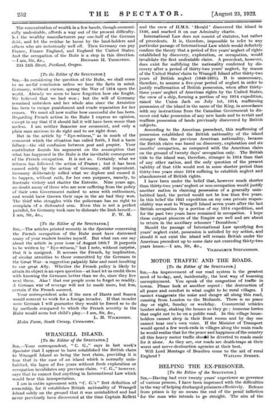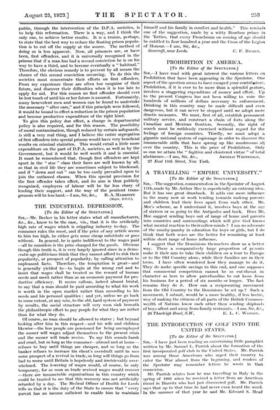HELPING THE EX-PRISONER.
[To the Editor of the SPECTATOR.] SIR,—Having had over twenty years' experience as governor of various prisons, I have been impressed with the difficulties in the way of helping discharged prisoners effectively. Release from prison is by no means the end of the penal infliction for the man who intends to go straight. The aim of the
public, through the intervention of the D.P.A. societies, is to help this reformation. There is a way, and I think the only one, to achieve better results. It is a truism, perhaps, to state that the best way to reduce the floating prison popula- tion is to cut off the supply at the source. The method of doing so is less apparent. Now, all prisoners are, or have been, first offenders, and it is universally recognised in the prisons that if a man has had a second conviction he is on his way to have a third, and to become eventually a "habitual." Therefore, the obvious remedy is to prevent by all means the chance of this second conviction occurring. To do this the societies must concentrate their efforts on first offenders. From my experience these are often too sanguine of their future, and discover their difficulties when it is too late to apply for aid. For this reason no first offender should ever be lost touch of until his or her future is assured. Fortunately, many benevolent men and women can be found to undertake the necessary "after care," and if this principle were followed, it would be bound to effect a reduction in the prison population and become productive expenditure of the right kind.
To give this policy due effect, a change in departmental policy is also required, and for this reason. The possibility of moral contamination, though reduced by certain safeguards, is still a very real thing, and I believe the entire segregation of first offenders into special prisons would have very beneficial results on criminal statistics. This would entail a little more expenditure on the part of D.P.A. societies, as well as by the Government, but it would be well worth it and is essential. It must be remembered that, though first offenders are kept apart in the " star " class their faces are well known by all, so that in civil life they are sometimes subject to blackmail, and if "down and out" can be too easily prevailed upon to join the outlawed classes. When this special provision for the first offender takes effect, and its aim is thus publicly recognized, employers of labour will be far less chary of lending their support, and the way of the penitent trans-
gressors will be less hard.—I am, Sir, &c., R. A. Maitatorr
(Major, D.S.0.).



































 Previous page
Previous page